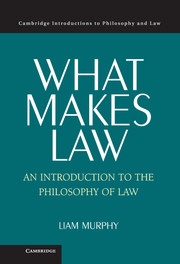8 - What Makes Law Law?
Law beyond the State
Published online by Cambridge University Press: 05 July 2014
Summary
A System?
In the final few pages of The Concept of Law, Hart argued that international law might best be understood not as a legal system, the rules of which are valid in virtue of a rule of recognition, but rather as a set of rules that are valid or binding just in virtue of being accepted and functioning as such. Though international law could therefore be compared to “primitive” law, this did not mean that international law was any less law, or any less binding as law. Hart’s point, to the contrary, was that it was a mistake to assume that the hierarchical structure of domestic legal systems was essential to law, or a condition of its normative force.
Nonetheless, Hart’s argument has not proved popular among international lawyers. As Martti Koskenniemi and Päivi Leino (2002, 558) put it:
Hart’s famous description of international law in terms of “rules that constitute not a system but a simple set” prompted generations of international lawyers to argue that a position which associated international law with “primitive law,” denied its grandeur and was thus mistaken.
Half a century on, the profession has not forgotten Hart's discussion. In 2006, the International Law Commission (ILC) adopted the “Conclusions of the work of the Study Group on the Fragmentation of International Law: Difficulties Arising from the Diversification and Expansion of International Law” (ILC 2006a); Hart's claims are engaged in the Study Group's very first Conclusion:
(1) International law as a legal system. International law is a legal system. Its rules and principles (i.e. its norms) act in relation to and should be interpreted against the background of other rules and principles. As a legal system, international law is not a random collection of such norms. There are meaningful relationships between them. Norms may thus exist at higher and lower hierarchical levels, their formulation may involve greater or lesser generality and specificity and their validity may date back to earlier or later moments in time.
- Type
- Chapter
- Information
- What Makes LawAn Introduction to the Philosophy of Law, pp. 144 - 182Publisher: Cambridge University PressPrint publication year: 2014



